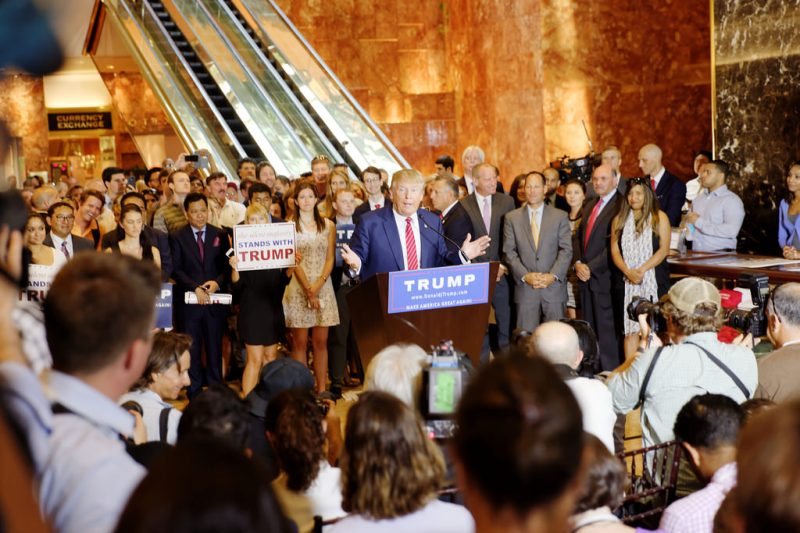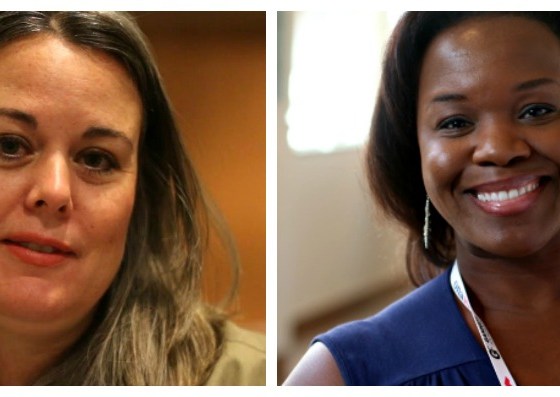
Nolan McCaskill, a reporter covering the presidential election for Politico, sums up the challenge well: “We have one candidate who’s not friendly to the press and another who does talk to the press, but is not very honest.”
Reporters like him have been tasked with covering both. Their work has received unprecedented scrutiny this year.
“It’s probably the hardest election that journalists have had to cover in modern times,” said Regina Lawrence, a journalism professor at the University of Oregon who studies the role of media in politics.
Criticizing the media is a mainstay of presidential elections. But between bumbling debate moderators, lopsided lines of questioning and the elephant-in-the-room question of how to cover an utterly unconventional candidate like Donald Trump, this election has jolted the media into critical self-reflection.
Lawrence said the media are struggling very openly with how to cover this election in a way that has never happened before.
“There have been a lot of interesting, thoughtful pieces in a variety of media really saying, ‘Are we blowing it?’” she said.
Debate over ‘equal’ coverage
For decades, media have strived to give opposing candidates coverage roughly equal in volume, depth and tone. But many in the industry worry following that mindset in this election has prevented journalists from tailoring coverage to the two very different candidates — and has led to unfairly negative stories about Clinton.
One theory about the negative coverage of Clinton is that the media more closely examine the candidate they expect will win. Seth Masket, a political science professor at the University of Denver, pointed out in a Pacific Standard article that research has showed the more popular a candidate was, the more negative coverage he or she received. Setting aside the unlikely interpretation that negative coverage is good for candidates, “the more plausible interpretation is that members of the media provide more scrutiny for candidates they expect to win,” he wrote.
Another is that the media are self-interested. In an article bluntly headlined, “Why the media is botching the election,” Brian Beutler of The New Republic argued that the media’s coverage is most thorough when its own interests are at stake.
“The press is not a pro-democracy trade, it is a pro-media trade,” he wrote. “Trump can do and say outrageous things all the time, and those things get covered in a familiar ‘did he really say that?’ fashion, but his individual controversies don’t usually get sustained negative coverage unless he is specifically undermining press freedom in some clear and simple way.”
Self-awareness is the key to fair coverage
Michael Wagner, a journalism and political science professor at the University of Wisconsin, said media organizations need to be self-aware. This semester, Wagner is overseeing a student newsroom fact-checking the presidential election.
“I don’t know that a journalist’s job is to say well, we need to find an equal amount of nefarious things on both sides,” Wagner said. “What can we learn about these candidates with respect to what they’ve done and how that might inform how they’ll perform as president?”
Wagner’s suggestion for journalists covering the election: When deciding whether a statement is newsworthy, forget who said it. Instead, ask yourself: If the president of the United States said this, is this a problem? If the answer is yes, they should cover it whether it’s Trump or not.
“Some journalists in this cycle have been willing to say, ‘Well, I don’t know if Trump really means that,’” Wagner said. “That, to me, isn’t doing anybody any favors.”
Earlier this month, New York Times columnist Paul Krugman scolded the media for seeming to grade Trump “on a curve.”
“If he manages to read from a TelePrompter without going off script, he’s being presidential,” Krugman wrote.
McCaskill, the Politico reporter, acknowledged the differing standards in a recent article. After reporting that Trump wished Clinton well after her pneumonia diagnosis was revealed, McCaskill added, “Trump, however, is such an unconventional candidate that even doing what any typical politician would warrants praise for his discipline.”
McCaskill said he strives to treat Trump more seriously than some did early in the campaign by checking Trump’s facts and pinning him down when he contradicts himself, just as he would with Clinton. And if he overlooks something, like when he didn’t call out an overstatement by Trump, he can count on an engaged reader to remind him.
“I got a wordy, all-bolded email for that,” he said.







You must be logged in to post a comment.